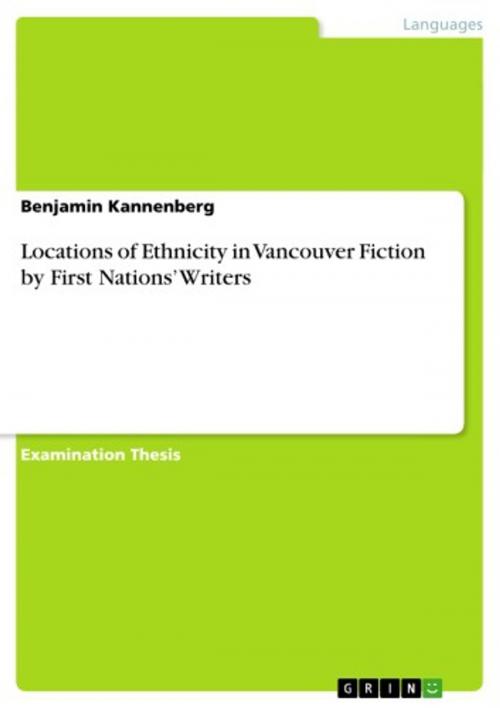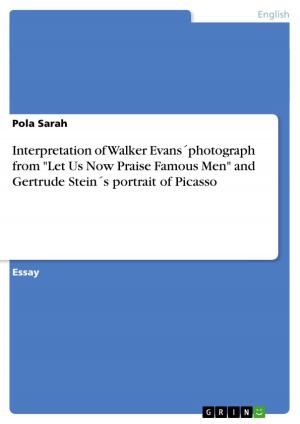Locations of Ethnicity in Vancouver Fiction by First Nations' Writers
Fiction & Literature, Literary Theory & Criticism, British| Author: | Benjamin Kannenberg | ISBN: | 9783640636624 |
| Publisher: | GRIN Publishing | Publication: | June 2, 2010 |
| Imprint: | GRIN Publishing | Language: | English |
| Author: | Benjamin Kannenberg |
| ISBN: | 9783640636624 |
| Publisher: | GRIN Publishing |
| Publication: | June 2, 2010 |
| Imprint: | GRIN Publishing |
| Language: | English |
Examination Thesis from the year 2009 in the subject English - Literature, Works, grade: 1,0, University of Constance (Fachbereich Amerikanistik), language: English, abstract: Vancouver, considered to be amongst the most beautiful cities in the world, is located in British Columbia on the Pacific coast of Canada. The city itself has a history of approximately 200 years of white settlement after its discovery by Europeans in 1792. However, the land has been occupied by indigenous people for at least 10,000 years.1 British Columbia has experienced more land claims than any other province with much of its land never having been ceded in a formal treaty (Conrad, Margaret/Alvin Finkel/Cornelius Jaenen 1993, 5), thus land plays an especially important role in the mindset of both Northwest Pacific Coast First Nations and other residents of British Columbia, and is and has been vitally present in the literature of its inhabitants. Whereas it is rather unambiguous to define the area of the city of Vancouver in Western terminology, this task proves to be challenging with respect to the First Nations' understanding of Vancouver as this name was given to the city only in 1886, yet First Nations people have been present at that location for thousands of years before.2 Thus the name itself has little or no significance to them and simply attests to the Eurocentric naming of the terra incognita or even terra nullius. First Nations are forced to live within the spatial restrictions put upon them by modern state structure. Due to the 'little correspondence between tribal culture areas and modern civil divisions' (Snipp 1989, 42), the definition of 'land' is already a constitutive act which defines First Nations identity. Vancouver and its surrounding areas are located on land which at the time of European contact belonged to the Coast Salish tribe. However, the realm of the literature analyzed in this paper does not restrict itself to texts written by Salish people but includes literature which deals with the Pacific West Coast, as the Salish tribe has always been subsumed under the Pacific Northwest tribes (Snipp 1989, 39) and First Nations people such as Spokane Gloria Bird believe that 'my relationship to my homeland, and that of the people of the Northwest in general, involves identifying not so much with a single reservation as with a larger territory' (Bird in Ortiz 1998, 31), theoretically even stretching across the U.S. border to Tacoma.
Examination Thesis from the year 2009 in the subject English - Literature, Works, grade: 1,0, University of Constance (Fachbereich Amerikanistik), language: English, abstract: Vancouver, considered to be amongst the most beautiful cities in the world, is located in British Columbia on the Pacific coast of Canada. The city itself has a history of approximately 200 years of white settlement after its discovery by Europeans in 1792. However, the land has been occupied by indigenous people for at least 10,000 years.1 British Columbia has experienced more land claims than any other province with much of its land never having been ceded in a formal treaty (Conrad, Margaret/Alvin Finkel/Cornelius Jaenen 1993, 5), thus land plays an especially important role in the mindset of both Northwest Pacific Coast First Nations and other residents of British Columbia, and is and has been vitally present in the literature of its inhabitants. Whereas it is rather unambiguous to define the area of the city of Vancouver in Western terminology, this task proves to be challenging with respect to the First Nations' understanding of Vancouver as this name was given to the city only in 1886, yet First Nations people have been present at that location for thousands of years before.2 Thus the name itself has little or no significance to them and simply attests to the Eurocentric naming of the terra incognita or even terra nullius. First Nations are forced to live within the spatial restrictions put upon them by modern state structure. Due to the 'little correspondence between tribal culture areas and modern civil divisions' (Snipp 1989, 42), the definition of 'land' is already a constitutive act which defines First Nations identity. Vancouver and its surrounding areas are located on land which at the time of European contact belonged to the Coast Salish tribe. However, the realm of the literature analyzed in this paper does not restrict itself to texts written by Salish people but includes literature which deals with the Pacific West Coast, as the Salish tribe has always been subsumed under the Pacific Northwest tribes (Snipp 1989, 39) and First Nations people such as Spokane Gloria Bird believe that 'my relationship to my homeland, and that of the people of the Northwest in general, involves identifying not so much with a single reservation as with a larger territory' (Bird in Ortiz 1998, 31), theoretically even stretching across the U.S. border to Tacoma.















